关于抄袭的英语作文3篇
抄袭 英语作文

I am a diligent student who usually takes pride in my work and academic achievements. However, due to a combination of procrastination and lack of understanding of the topic, I found myself struggling to complete an English essay on time. Fearing the consequences of late submission and a low grade, I succumbed to the temptation of copying a few paragraphs from an online source without proper citation.
V. Steps to Rectify the Situation
In order to rectify the situation, I have taken the following steps. Firstly, I have personally apologized to my teacher and classmates for my actions, expressing sincere remorse and a commitment to never engage in plagiarism again. Additionally, I have retracted my plagiarized essay and committed to rewriting it from scratch, ensuring proper research, citation, and originality in my work. Furthermore, I have requested additional support and guidance from my teacher to improve my understanding of the subject and enhance my writing skills.
关于抄袭的英语作文

关于抄袭的英语作文英文回答:Plagiarism is a serious issue that affects students, writers, and researchers around the world. It is the act of using someone else's work, ideas, or words without giving them proper credit. As a writer myself, I understand the importance of originality and the consequences of plagiarism.Plagiarism can take many forms, such as copying and pasting text from the internet without citation, using someone else's ideas without permission, or even purchasing a paper from a ghostwriter. In my experience, I have seen cases of students copying essays from their peers or using online sources without acknowledging the original authors.The consequences of plagiarism can be severe. In academic settings, students can face failing grades, suspension, or even expulsion for plagiarizing. Inprofessional settings, writers and researchers can damage their reputation and credibility by being accused of plagiarism. In some cases, legal action can be taken against those who plagiarize.To avoid plagiarism, it is important to always give credit to the original source when using someone else's work. This can be done through proper citation, quotation marks, and paraphrasing. Additionally, it is crucial to develop one's own ideas and writing style to reduce the temptation of copying from others.In my opinion, plagiarism is not only unethical but also detrimental to one's personal and professional growth. By relying on the work of others, individuals miss out on the opportunity to develop their own skills and knowledge. As the saying goes, "honesty is the best policy," and this certainly applies to writing and academic integrity.中文回答:抄袭是一个严重的问题,影响着世界各地的学生、作家和研究人员。
关于抄袭的英语作文
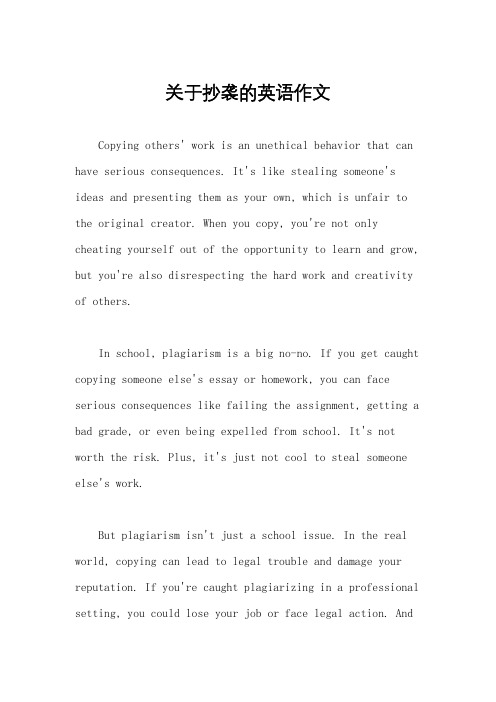
关于抄袭的英语作文Copying others' work is an unethical behavior that can have serious consequences. It's like stealing someone's ideas and presenting them as your own, which is unfair to the original creator. When you copy, you're not only cheating yourself out of the opportunity to learn and grow, but you're also disrespecting the hard work and creativity of others.In school, plagiarism is a big no-no. If you get caught copying someone else's essay or homework, you can face serious consequences like failing the assignment, getting a bad grade, or even being expelled from school. It's not worth the risk. Plus, it's just not cool to steal someone else's work.But plagiarism isn't just a school issue. In the real world, copying can lead to legal trouble and damage your reputation. If you're caught plagiarizing in a professional setting, you could lose your job or face legal action. Andeven if you don't get caught, the guilt and shame of knowing you cheated can weigh on you heavily.So, how can you avoid plagiarism? The best way is to always cite your sources and give credit to the original creator. If you use someone else's ideas or information, make sure you properly acknowledge them and provide a link or reference to the original source. This shows respect and helps maintain the integrity of the work you're producing。
作业抄袭英语作文1
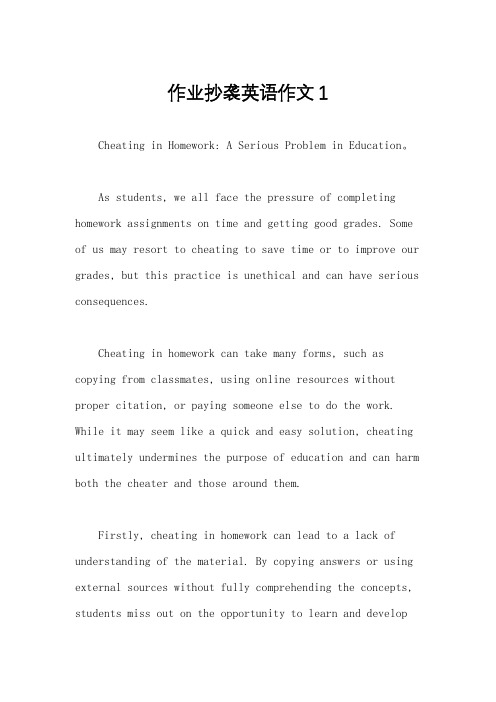
作业抄袭英语作文1Cheating in Homework: A Serious Problem in Education。
As students, we all face the pressure of completing homework assignments on time and getting good grades. Some of us may resort to cheating to save time or to improve our grades, but this practice is unethical and can have serious consequences.Cheating in homework can take many forms, such as copying from classmates, using online resources without proper citation, or paying someone else to do the work. While it may seem like a quick and easy solution, cheating ultimately undermines the purpose of education and can harm both the cheater and those around them.Firstly, cheating in homework can lead to a lack of understanding of the material. By copying answers or using external sources without fully comprehending the concepts, students miss out on the opportunity to learn and developcritical thinking skills. This can have a negative impact on their academic performance in the long run, as well as their ability to apply knowledge in real-world situations.Secondly, cheating in homework can damage the integrity of the education system. When students cheat, they not only deceive their teachers and classmates, but also compromise the value of their degree or diploma. This can have far-reaching consequences, as it undermines the credibility of the entire education system and can lead to a loss of trust in academic institutions.Moreover, cheating in homework can have legal and ethical implications. Plagiarism, for example, can resultin legal action or academic penalties, such as failing a course or even expulsion from school. Cheating can also have ethical consequences, as it violates the principles of honesty, fairness, and respect for intellectual property.To address the problem of cheating in homework, it is important for educators to promote a culture of academic integrity. This can be done through clear communication ofexpectations and consequences, as well as by providing students with the resources and support they need to succeed. Teachers can also use technology to detect plagiarism and other forms of cheating, and can work with students to identify and address the root causes of academic dishonesty.In conclusion, cheating in homework is a serious problem in education that can have negative consequences for both individuals and society as a whole. It is important for students to understand the value of academic integrity and to resist the temptation to cheat, even when faced with pressure or time constraints. By promoting a culture of honesty and respect for intellectual property, we can ensure that education remains a valuable and meaningful pursuit for all.。
抄袭现象英语作文
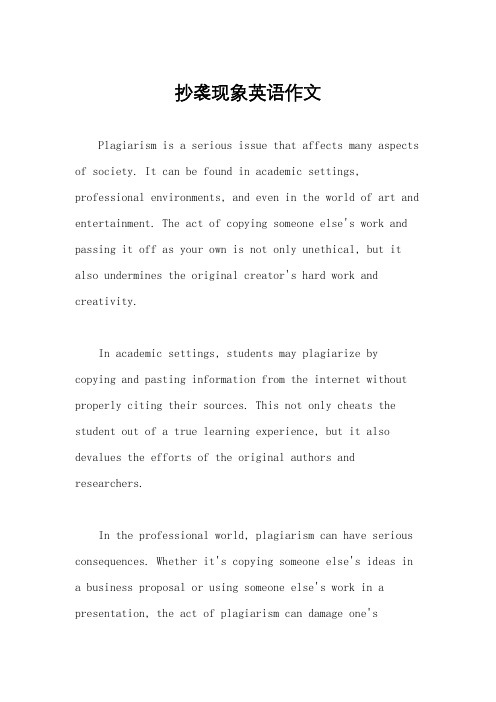
抄袭现象英语作文Plagiarism is a serious issue that affects many aspects of society. It can be found in academic settings, professional environments, and even in the world of art and entertainment. The act of copying someone else's work and passing it off as your own is not only unethical, but it also undermines the original creator's hard work and creativity.In academic settings, students may plagiarize by copying and pasting information from the internet without properly citing their sources. This not only cheats the student out of a true learning experience, but it also devalues the efforts of the original authors and researchers.In the professional world, plagiarism can have serious consequences. Whether it's copying someone else's ideas in a business proposal or using someone else's work in a presentation, the act of plagiarism can damage one'sreputation and credibility.In the world of art and entertainment, plagiarism can take the form of copying someone else's music, literature,or visual art. This not only robs the original creator of their deserved recognition and compensation, but it also stifles innovation and creativity in the industry.Plagiarism is not only a violation of ethical standards, but it also has legal implications. In many cases, plagiarism can result in lawsuits and financial penaltiesfor the guilty party. This serves as a deterrent for those who may be tempted to take credit for someone else's work.To combat plagiarism, it's important for individualsand institutions to promote a culture of originality and integrity. This can be achieved through education, awareness, and the implementation of strict policies and consequences for those who engage in plagiarism.In conclusion, plagiarism is a widespread issue thathas far-reaching consequences. It undermines the efforts oforiginal creators, damages reputations, and can even lead to legal repercussions. It's important for individuals and society as a whole to take a stand against plagiarism and promote a culture of honesty and integrity.。
对抄袭现象的英语作文
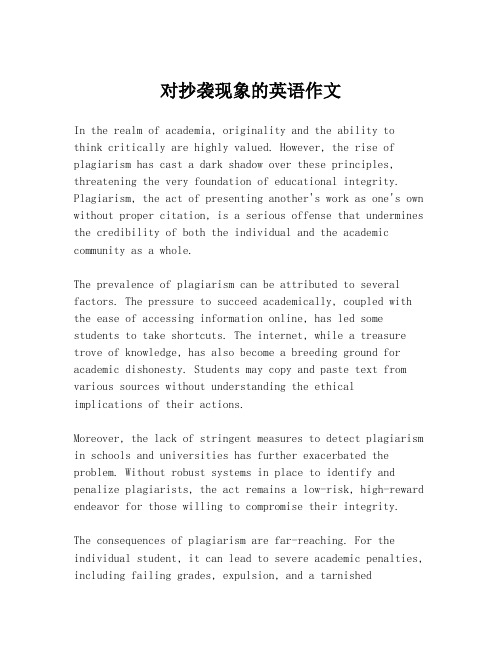
对抄袭现象的英语作文In the realm of academia, originality and the ability tothink critically are highly valued. However, the rise of plagiarism has cast a dark shadow over these principles, threatening the very foundation of educational integrity. Plagiarism, the act of presenting another's work as one's own without proper citation, is a serious offense that undermines the credibility of both the individual and the academic community as a whole.The prevalence of plagiarism can be attributed to several factors. The pressure to succeed academically, coupled with the ease of accessing information online, has led some students to take shortcuts. The internet, while a treasure trove of knowledge, has also become a breeding ground for academic dishonesty. Students may copy and paste text from various sources without understanding the ethicalimplications of their actions.Moreover, the lack of stringent measures to detect plagiarism in schools and universities has further exacerbated the problem. Without robust systems in place to identify and penalize plagiarists, the act remains a low-risk, high-reward endeavor for those willing to compromise their integrity.The consequences of plagiarism are far-reaching. For the individual student, it can lead to severe academic penalties, including failing grades, expulsion, and a tarnishedreputation. For the academic community, it erodes trust and devalues the hard work of those who genuinely strive for scholarly excellence.To combat this issue, educational institutions must adopt a multi-faceted approach. Firstly, there should be a strong emphasis on educating students about the importance of academic integrity from an early stage. Workshops, seminars, and courses that highlight the ethical considerations of research and writing can be instrumental in fostering a culture of honesty and respect for intellectual property.Secondly, the implementation of advanced plagiarism detection software can serve as a deterrent. By making it moredifficult for students to pass off他人的 work as their own, these tools can help to maintain a level playing field and discourage dishonest practices.Lastly, fostering a supportive and collaborative learning environment can also play a role in reducing the incidence of plagiarism. When students feel empowered to ask for help and work together, they are less likely to resort to dishonest means to achieve academic success.In conclusion, plagiarism is a complex issue that requires a comprehensive solution. By promoting academic integrity, implementing effective detection systems, and creating a collaborative learning environment, we can work towards a future where original thought and honest effort are the cornerstones of academic achievement. It is our collective responsibility to ensure that the pursuit of knowledgeremains untainted by the unethical practices that seek to undermine it.。
论文抄袭的英语作文

论文抄袭的英语作文AbstractWith the rapid development of technology and the internet, academic plagiarism has become a serious issue in recent years. This essay aims to discuss the consequences of plagiarism in academic writing and provide some suggestions to prevent plagiarism.IntroductionAcademic plagiarism refers to the act of using someone else’s ideas, words, or work without giving proper credit. It is a form of dishonesty that undermines the integrity and credibility of the academic community. In this era of information explosion, students and researchers often face immense pressure to produce original and high-quality work, leading some to resort to plagiarism. This essay will explore the impact of academic plagiarism and propose effective strategies to counteract this problem.The Consequences of Plagiarism1.Academic Consequences–Academic institutions have strict policies against plagiarism.Students found guilty of plagiarism may face severe penalties, includingfailing grades, academic probation, or even expulsion.–Plagiarism undermines the educational process, as it denies students the opportunity to develop critical thinking and research skills.–Plagiarism also harms the reputation of universities and academic institutions, affecting their credibility and rankings.2.Ethical Consequences–Plagiarism is a breach of academic integrity, violating the moral principles of honesty, trustworthiness, and fairness.–It undermines the trust between students and educators, as well as the trust within the academic community as a whole.–Plagiarism devalues the efforts and contributions of original authors, leading to a lack of recognition for their hard work.3.Legal Consequences–Plagiarism can have legal ramifications, as it infringes upon copyright laws. Authors have the right to protect their intellectualproperty, and plagiarism is a violation of this right.–In some cases, plagiarism can result in lawsuits and financial penalties.Preventing Plagiarism1.Awareness and Education–Educate students about the importance of academic integrity and the consequences of plagiarism.–Provide clear guidelines on proper citation and referencing techniques.–Teach students how to paraphrase and summarize information effectively.2.Time Management and Planning–Encourage students to manage their time effectively to avoid last-minute rushes, which can increase the temptation to plagiarize.–Break down assignments into smaller tasks and set deadlines for each stage to promote proper time allocation.e of Plagiarism Detection Tools–Institutions should invest in plagiarism detection software to identify instances of plagiarism accurately.–Students can also utilize these tools to check their work before submission, ensuring originality.4.Encourage Critical Thinking–Foster an environment that promotes critical thinking and independent research.–Encourage students to develop their ideas and opinions rather than relying solely on existing sources.ConclusionAcademic plagiarism is a serious offense that undermines the integrity of the academic community. It has severe consequences for students, institutions, and the overall educational system. By promoting awareness, implementing preventive measures, and fostering critical thinking, we can combat plagiarism effectively. It is crucial for students, educators, and institutions to work together to uphold academic integrity and ensure the originality and credibility of scholarly work.。
关于中学生是否抄袭作业的英语作文
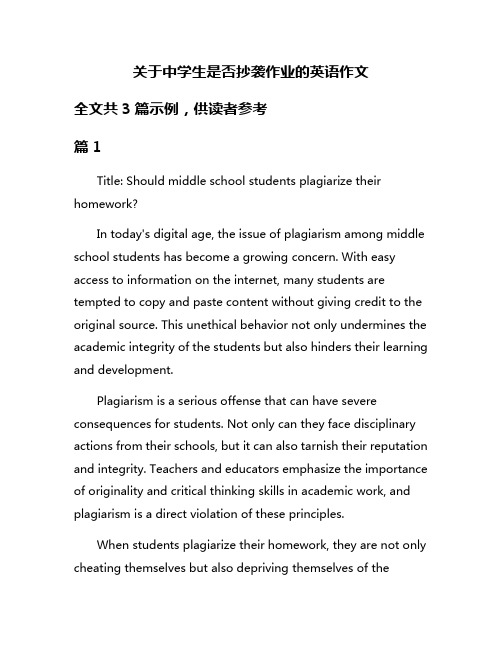
关于中学生是否抄袭作业的英语作文全文共3篇示例,供读者参考篇1Title: Should middle school students plagiarize their homework?In today's digital age, the issue of plagiarism among middle school students has become a growing concern. With easy access to information on the internet, many students are tempted to copy and paste content without giving credit to the original source. This unethical behavior not only undermines the academic integrity of the students but also hinders their learning and development.Plagiarism is a serious offense that can have severe consequences for students. Not only can they face disciplinary actions from their schools, but it can also tarnish their reputation and integrity. Teachers and educators emphasize the importance of originality and critical thinking skills in academic work, and plagiarism is a direct violation of these principles.When students plagiarize their homework, they are not only cheating themselves but also depriving themselves of theopportunity to learn and grow. By copying someone else's work, students miss out on the chance to critically analyze information, develop their own ideas, and enhance their understanding of the subject matter.Moreover, plagiarism can have long-term negative effects on students' academic and professional careers. It can undermine their credibility and trustworthiness in the eyes of their teachers, peers, and future employers. In a competitive world where originality and creativity are highly valued, students who engage in plagiarism are putting themselves at a significant disadvantage.To combat the issue of plagiarism among middle school students, it is essential for educators and parents to take proactive measures. Teachers can educate students about the importance of academic integrity, the consequences of plagiarism, and the proper ways to cite sources. They can also implement technology tools to detect plagiarism and discourage students from engaging in unethical behavior.Parents can also play a crucial role in addressing plagiarism by instilling a strong sense of ethics and responsibility in their children. By reinforcing the values of honesty, integrity, and hardwork, parents can help prevent their children from succumbing to the temptation of plagiarizing their homework.Ultimately, the decision to plagiarize or not lies in the hands of the students themselves. They must understand the importance of academic integrity, take pride in their work, and strive to achieve success through their own efforts. By embracing these values and principles, students can avoid the pitfalls of plagiarism and fulfill their academic potential.篇2The issue of whether or not middle school students plagiarize their homework is a topic that has been widely debated in recent years. In this essay, we will examine the reasons why some middle school students choose to plagiarize their work, the consequences of this behavior, and some potential solutions to the problem.There are several reasons why some middle school students may choose to plagiarize their homework. One of the most common reasons is the pressure to perform well academically. Many students feel overwhelmed by the workload and expectations placed on them by teachers and parents, and may resort to plagiarism as a way to cope with this stress. Additionally,some students may simply not understand the concept of plagiarism and may inadvertently copy work without realizing it is wrong.The consequences of plagiarism can be severe for middle school students. Not only does it undermine the value of their education, but it also sets a dangerous precedent for their future academic and professional careers. Plagiarism can result in failing grades, disciplinary action from the school, and even expulsion in some cases. Furthermore, students who plagiarize miss out on the opportunity to develop important critical thinking and research skills that are essential for success in the real world.In order to combat the issue of plagiarism among middle school students, it is important for educators and parents to take a proactive approach. Teachers should provide clear guidelines on what constitutes plagiarism and how to properly cite sources. Additionally, schools can implement plagiarism detection software to help identify cases of academic dishonesty. Parents can also play a role in addressing this issue by encouraging their children to take pride in their work and emphasizing the importance of academic integrity.Overall, the issue of plagiarism among middle school students is a serious problem that requires attention from all stakeholders involved in their education. By addressing the root causes of plagiarism, providing clear guidelines, and promoting academic integrity, we can help ensure that students develop the skills and values necessary for success in both their academic and professional lives.篇3Title: Should Middle School Students Plagiarize Homework?In today's competitive academic environment, students are under pressure to excel in their studies. This pressure can sometimes lead to unethical behavior, such as plagiarism. Plagiarism is the act of using someone else's work and passing it off as your own. It is a serious offense that can have far-reaching consequences. In this essay, we will explore the issue of whether middle school students should plagiarize their homework.First and foremost, plagiarism is dishonest. When students copy someone else's work and present it as their own, they are not only deceiving their teachers but also cheating themselves out of the opportunity to learn and grow. Academic dishonestyerodes the trust between students and teachers and undermines the integrity of the educational system.Furthermore, plagiarism hinders students' personal and intellectual development. When students plagiarize their homework, they are depriving themselves of the opportunity to think critically, solve problems, and develop their own ideas. By relying on someone else's work, students are not developing the skills and knowledge that are necessary for success in school and beyond.Moreover, plagiarism has serious consequences. In many schools, plagiarism is considered a serious academic offense that can result in disciplinary action, such as failing grades, suspension, or expulsion. In addition, students who plagiarize their work may suffer from feelings of guilt, shame, and anxiety. These negative emotions can have a detrimental impact on students' mental health and overall wellbeing.On the other hand, some students may argue that plagiarism is a practical and efficient way to complete their homework. They may feel overwhelmed by the demands of school and the pressure to perform well academically. However, while plagiarism may provide a short-term solution to academicchallenges, it ultimately undermines students' long-term success and personal growth.In conclusion, plagiarism is a serious issue that middle school students should avoid at all costs. Instead of resorting to dishonesty, students should seek help from their teachers, classmates, or parents when they need assistance with their homework. By working hard, being honest, and taking responsibility for their own learning, students can achieve academic success while maintaining their integrity and ethical standards.。
抄袭问题的英语作文
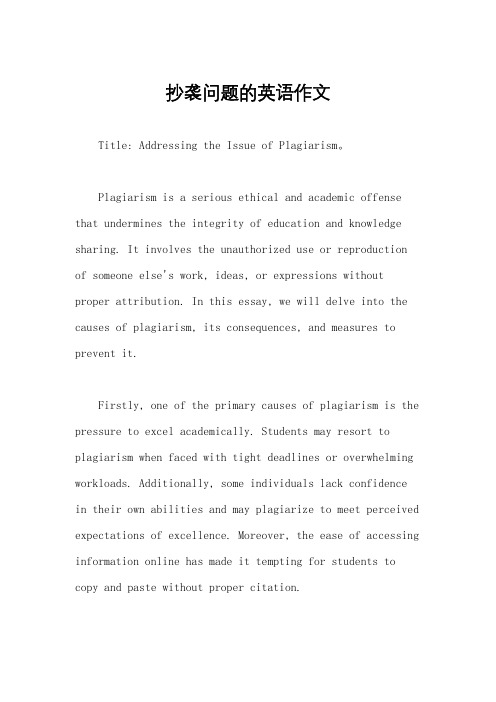
抄袭问题的英语作文Title: Addressing the Issue of Plagiarism。
Plagiarism is a serious ethical and academic offense that undermines the integrity of education and knowledge sharing. It involves the unauthorized use or reproduction of someone else's work, ideas, or expressions without proper attribution. In this essay, we will delve into the causes of plagiarism, its consequences, and measures to prevent it.Firstly, one of the primary causes of plagiarism is the pressure to excel academically. Students may resort to plagiarism when faced with tight deadlines or overwhelming workloads. Additionally, some individuals lack confidencein their own abilities and may plagiarize to meet perceived expectations of excellence. Moreover, the ease of accessing information online has made it tempting for students to copy and paste without proper citation.Secondly, the consequences of plagiarism can be severe. From an academic standpoint, it can result in failing grades, suspension, or even expulsion from educational institutions. Beyond academics, it tarnishes one's reputation and credibility. In professional settings, plagiarism can lead to legal repercussions, loss of employment, and damage to one's career prospects. Furthermore, it undermines the principles of academic integrity and diminishes the value of originalcontributions to knowledge.To address the issue of plagiarism, it is essential to foster a culture of academic honesty and integrity. Educators play a crucial role in promoting awareness about plagiarism and its consequences. By incorporating discussions about plagiarism into the curriculum and providing guidance on proper citation and referencing, educators can empower students to engage with academic work ethically.Furthermore, institutions should implement robust policies and procedures to detect and deter plagiarism.This may include using plagiarism detection software toscan students' submissions for potential instances of plagiarism. Additionally, providing clear guidelines onwhat constitutes plagiarism and the penalties for such misconduct can serve as a deterrent.Moreover, cultivating a supportive learning environment where students feel encouraged to seek help andclarification can mitigate the temptation to plagiarize. Encouraging critical thinking and originality in assignments can also foster a culture of academic integrity.Individual responsibility is also paramount in combating plagiarism. Students must understand the importance of academic honesty and take ownership of their work. This includes properly citing sources, paraphrasing, and seeking permission when using others' work.In conclusion, plagiarism is a significant issue that undermines the principles of academic integrity and knowledge sharing. Addressing this issue requires a multifaceted approach involving educators, institutions,and individual students. By promoting awareness, implementing effective policies, and fostering a culture of academic honesty, we can mitigate the prevalence of plagiarism and uphold the integrity of education.。
抄袭的危害 英语作文

抄袭的危害英语作文英文回答:Plagiarism is a serious academic offense that can have severe consequences for students. It is the act of using someone else's work or ideas without giving them proper credit. This can include copying text from a book or website, paraphrasing someone else's work, or using someone else's ideas without citing the source.Plagiarism is wrong for several reasons. First, it is a form of cheating. When you plagiarize, you are takingcredit for someone else's work. This is unfair to the original author and to your classmates who have done their own work. Second, plagiarism can damage your reputation. If you are caught plagiarizing, you may be seen as a dishonest person. This can make it difficult to get a job or into graduate school. Third, plagiarism can have legal consequences. In some cases, you may be sued for copyright infringement.There are many ways to avoid plagiarism. The best wayis to always cite your sources. When you use someone else's work or ideas, be sure to give them credit. You can do this by including a citation in your text or by creating a works cited page. You should also be careful to paraphrase someone else's work in your own words. If you are not sure whether something is plagiarism, it is always best to err on the side of caution and cite your sources.Here are some examples of plagiarism:Copying a paragraph from a book or website and pasting it into your paper without citing the source.Paraphrasing someone else's work without citing the source.Using someone else's ideas without citing the source.Submitting a paper that you wrote for another class.Buying a paper from a website.If you are caught plagiarizing, you may face a variety of consequences. These consequences may include:Failing the assignment。
写作抄袭的例子英文作文

写作抄袭的例子英文作文英文:Cheating in writing, particularly through plagiarism,is a prevalent issue that undermines academic integrity and originality. It's like trying to build a house on someone else's foundation. While it might save time initially, it ultimately collapses under scrutiny. Let me illustrate this with a personal anecdote.Back in high school, during a literature assignment, I found myself struggling to articulate my thoughts on a complex poem. Frustrated and pressed for time, I turned to the internet for help. Copying and pasting sections of analyses, I thought I had cleverly bypassed the challenge. However, when the teacher returned the graded papers, I was shocked to see a failing grade with a stern warning about plagiarism.Caught red-handed, I had to confront the consequencesof my actions. Not only had I failed to learn from thepoem's intricacies, but I had also eroded the trust my teacher had in my academic abilities. It was a wake-up call, teaching me that shortcuts in writing often lead to dead ends.Moreover, plagiarism not only undermines personalgrowth but also disrespects the original author's work.It's akin to stealing someone's ideas and claiming them as your own. Just as we wouldn't want someone raiding ourfridge without permission, we shouldn't raid someone's intellectual pantry without citation.In the professional world, the repercussions of plagiarism can be even more severe. Imagine submitting a report at work, only to be called out by a colleague for lifting entire paragraphs from a competitor's website.Trust and credibility shattered, one's career prospects could take a nosedive.In essence, plagiarism is a shortcut with long-term detriments. It's like borrowing someone else's umbrella ona rainy day without asking, only to find it torn and broken when the storm hits. To truly succeed in writing, one must embrace the challenge, hone their skills, and respect the intellectual property of others.中文:在写作中作弊,特别是抄袭,是一个普遍存在的问题,它破坏了学术诚信和原创性。
我们应该如何看待抄袭问题的英语作文

我们应该如何看待抄袭问题的英语作文全文共3篇示例,供读者参考篇1How Should We View the Issue of Plagiarism?Plagiarism has been a hot topic of debate in academic circles for years. As students, we are constantly warned about the perils of plagiarizing and the severe consequences that may follow. But is the issue really as black and white as it's made out to be? I believe we need to take a more nuanced approach when it comes to plagiarism and examine it from multiple angles.First, let's define what plagiarism actually is. According to the Merriam-Webster dictionary, it is "the act of using another person's words or ideas without giving credit to that person." In essence, it's a form of academic dishonesty and intellectual theft. However, the lines can get blurred when we consider concepts like common knowledge, paraphrasing, and inspiration.We've all been in situations where we've unintentionally used a few words or phrases that we may have come across somewhere else without realizing it. Does that constitute plagiarism? Or what about when we read something that inspiresour own thoughts and ideas, which we then express in our own words? It's a slippery slope, and we need to be careful about not over-policing every instance of potential plagiarism.That being said, blatant plagiarism, where entire passages or ideas are copied verbatim without proper attribution, is inexcusable. It undermines the very essence of academic integrity and robs the original author of their intellectual property. As students, we must learn to respect the hard work and creativity of others and give credit where it's due.But we also need to consider the reasons why students might be tempted to plagiarize in the first place. Oftentimes, it's a result of immense pressure to perform, meet deadlines, and juggle multiple assignments simultaneously. In today'sfast-paced academic environment, it's easy to get overwhelmed and make poor choices. Instead of simply punishing plagiarism, we should strive to create a supportive learning environment that fosters time management skills, stress management, and a genuine love for learning.Another factor to consider is the prevalence of information and the ease of access to it in the digital age. With just a few clicks, we can find entire essays, research papers, and even books online. While this accessibility is a boon for learning and research,it also presents temptations for those who might be inclined to take shortcuts. As educators and students, we need to emphasize the importance of ethical behavior and instill a sense of pride in producing original work.Moreover, we should acknowledge that not all instances of plagiarism are created equal. There's a vast difference between intentionally plagiarizing an entire paper and accidentally forgetting to cite a couple of sentences. While the latter is still unacceptable, it shouldn't be treated with the same severity as the former. A more nuanced approach to penalties and consequences might be more effective in curbing plagiarism while also recognizing the complexities involved.Ultimately, the issue of plagiarism is not just about adhering to academic rules and regulations; it's about upholding the fundamental values of honesty, integrity, and respect for intellectual property. As students, we have a responsibility to embrace these values and strive for excellence through our own efforts.At the same time, we should also recognize that we're all human, and mistakes can happen. Instead of adopting azero-tolerance policy that punishes even the slightest infractions, we should aim for a more balanced approach that focuses oneducation, prevention, and fostering a culture of academic integrity.One way to achieve this could be through mandatory plagiarism awareness workshops and tutorials for incoming students. These sessions could not only clarify what constitutes plagiarism but also provide practical tips on proper citation, paraphrasing, and time management. By addressing the issue proactively, we can instill a sense of responsibility and empower students to make ethical choices from the outset.Additionally, we could explore the implementation of plagiarism detection software not just as a punitive measure but also as a learning tool. By allowing students to run their work through these systems before submission, they can identify and correct any unintentional instances of plagiarism, thus reinforcing the importance of proper attribution.Another approach could be to encourage more collaborative and project-based learning, where students work together to create original content. This not only fosters teamwork and communication skills but also promotes a sense of ownership and pride in one's work, reducing the temptation to plagiarize.Ultimately, the issue of plagiarism is a complex one, and there are no easy solutions. However, by adopting a morenuanced and multifaceted approach, we can address the root causes while still upholding academic integrity. It's a delicate balance, but one that is crucial for maintaining the credibility and value of our educational institutions.As students, we have a responsibility to embrace ethical behavior and strive for excellence through our own efforts. But we should also acknowledge the pressures and temptations that can lead to plagiarism and work towards creating a supportive learning environment that fosters integrity and original thinking.Only by taking a holistic approach, one that combines education, prevention, and a culture of academic honesty, can we truly address the issue of plagiarism and uphold the values that are so integral to the pursuit of knowledge.篇2How Should We View the Issue of Plagiarism?Plagiarism is a major issue that plagues academic institutions and the world of writing. As students, we are constantly reminded about the severe consequences of plagiarizing someone else's work, with punishments ranging from a failing grade to expulsion or even legal action. However, despite the warnings, cases of plagiarism continue to surface,often driven by factors such as pressure to succeed, lack of understanding, or sheer laziness. In this essay, I will explore the complexities surrounding plagiarism and offer my perspective on how we, as students, should approach this critical issue.To begin with, it is essential to understand what constitutes plagiarism. At its core, plagiarism involves using someone else's ideas, words, or creative work without proper attribution or citation. This includes copying text verbatim from a source without quotation marks or proper referencing, paraphrasing too closely to the original work, or even presenting someone else's ideas as your own. Plagiarism can occur intentionally or unintentionally, but regardless of the intent, it is a serious offense in the academic and professional world.One of the primary reasons why plagiarism is so heavily condemned is that it undermines the fundamental principles of academic integrity and intellectual property rights. Education is built upon the foundation of sharing knowledge, exchanging ideas, and building upon the work of others. When someone plagiarizes, they are not only cheating themselves out of the learning experience but also disrespecting the efforts and intellectual contributions of others. Additionally, plagiarism can have severe legal implications, particularly in the realm ofcopyright infringement, where authors and creators have the right to protect their original works.From a student's perspective, the temptation to plagiarize can stem from various factors. The pressure to excel academically, meet deadlines, and juggle multiple responsibilities can sometimes lead students to take shortcuts, rationalizing plagiarism as a temporary solution. However, this short-term gain can have long-term consequences, not only in terms of potential disciplinary action but also in undermining the value of one's own education and personal growth.Another factor that contributes to plagiarism is a lack of understanding or proper training on citation practices and academic writing conventions. Many students, particularly those new to the academic environment, may struggle with properly attributing sources and navigating the complexities of citation styles. This highlights the importance of educational institutions providing clear guidelines, resources, and support to help students develop effective research and writing skills from an early stage.Despite the challenges, it is crucial that we, as students, adopt a zero-tolerance approach towards plagiarism. Firstly, we must cultivate a genuine passion for learning and a respect forintellectual property. By embracing the journey of acquiring knowledge and developing our own ideas, we not only enrich our personal growth but also contribute to the advancement of human understanding. Secondly, we should strive to develop strong time management skills, seek help when needed, and prioritize our academic responsibilities to avoid succumbing to the temptation of plagiarism due to procrastination or overwhelming workloads.Furthermore, we must foster a culture of academic integrity within our student communities. This can be achieved by engaging in open discussions about plagiarism, sharing best practices for proper citation and referencing, and holding each other accountable for upholding ethical standards. By creating a supportive and collaborative environment, we can encourage one another to embrace the values of originality, creativity, and intellectual honesty.It is also important to recognize that plagiarism is not a black-and-white issue; there may be instances where inadvertent mistakes occur, or where the boundaries between inspiration and plagiarism become blurred. In such cases, open communication with instructors and a willingness to learn frommistakes can go a long way in promoting a constructive learning environment.In conclusion, plagiarism is a complex issue that demands our attention and commitment to upholding academic integrity. As students, we must recognize the gravity of plagiarism and its far-reaching consequences. By cultivating a genuine love for learning, developing strong research and writing skills, fostering a culture of accountability, and embracing open dialogue, we can collectively address the issue of plagiarism and uphold the values that underpin the pursuit of knowledge. Only by taking a principled stance against plagiarism can we truly honor the intellectual contributions of others and preserve the integrity of our own academic and personal growth.篇3How Should We View the Issue of Plagiarism?Plagiarism has been a major issue in academic circles for decades, sparking heated debates and controversies time and again. As students, we are constantly reminded about the severe consequences of plagiarizing, which can range from failing a course to even expulsion from our institutions. However, despite the stern warnings, cases of plagiarism continue to surfaceregularly, begging the question – how should we really view this complex issue?Before delving deeper, it's crucial to understand what constitutes plagiarism. Simply put, plagiarism is the act of presenting someone else's work or ideas as one's own, without proper attribution or citation. This could involve copying text verbatim from a source, paraphrasing without acknowledgment, or even claiming someone else's original thoughts or findings as your own. Regardless of the form, plagiarism is considered a serious ethical breach and a violation of academic integrity.From a student's perspective, the temptation to plagiarize can stem from various factors. For some, it may be the pressure to perform well academically, coupled with the overwhelming workload and tight deadlines. Others may struggle with poor time management or procrastination, leading them to take shortcuts in desperate situations. Additionally, some students may not fully grasp the concept of plagiarism or the proper methods of citation and referencing.However, it's important to recognize that none of these reasons justify plagiarism. As students, we have a responsibility to uphold academic honesty and maintain the integrity of our educational pursuits. Plagiarism not only undermines the valueof our efforts but also deprives us of the opportunity to truly learn and grow through the process of researching, analyzing, and synthesizing information.Moreover, the consequences of plagiarism can be severe, both in the short and long term. Aside from potential academic penalties, plagiarism can tarnish our reputations and undermine the credibility of our work. In today's interconnected world, where information is readily accessible and easily verifiable, instances of plagiarism can have far-reaching implications, potentially damaging our future prospects in professional and academic spheres.That being said, it's crucial to acknowledge that not all cases of plagiarism are intentional or malicious. Sometimes, students may inadvertently fail to cite sources properly or misunderstand the nuances of proper attribution. In such instances, a more constructive approach may be warranted, focusing on educating and guiding students toward better academic practices.Additionally, we must recognize that the temptation to plagiarize can be exacerbated by external factors, such as the prevalence of online resources and the ease of access to information. In an era where copy-and-paste functionality is readily available, the line between legitimate research andplagiarism can become blurred, especially for students who may not fully comprehend the ethical implications of their actions.To address this issue, educational institutions and instructors play a crucial role in promoting academic integrity and providing clear guidelines on proper citation practices. Incorporating lessons on plagiarism, referencing techniques, and ethical research practices into the curriculum can equip students with the necessary knowledge and skills to navigate the academic landscape responsibly.Furthermore, institutions should implement robust plagiarism detection systems and enforce consistent consequences for violations. However, it's equally important to foster an environment that encourages open dialogue and supports students who may be struggling with academic challenges. By offering resources such as writing centers, tutoring services, and stress management programs, institutions can help alleviate some of the pressures that may contribute to plagiarism.As students, we must also take personal responsibility for our actions and strive to uphold the highest standards of academic integrity. This includes developing effective time management skills, seeking help when needed, and cultivating agenuine passion for learning and intellectual curiosity. By embracing these values, we not only safeguard our academic credibility but also contribute to the advancement of knowledge and the pursuit of truth.Ultimately, plagiarism is a complex issue that requires a multifaceted approach. While strict penalties and deterrents are necessary, we must also recognize the underlying factors that may contribute to this behavior and address them through education, support, and a culture of academic honesty.By fostering an environment that values intellectual integrity, promoting ethical research practices, and providing students with the necessary resources and guidance, we can create a paradigm shift in how plagiarism is perceived and addressed within academic communities.It is our collective responsibility – as students, educators, and institutions – to uphold the principles of academic integrity and ensure that plagiarism is not only discouraged but also understood as a moral and ethical breach that undermines the very essence of scholarly pursuits. Only then can we truly embrace the transformative power of education and contribute to the creation and dissemination of knowledge in a meaningful and ethical manner.。
我们应该看待抄袭问题英语作文

我们应该看待抄袭问题英语作文英文回答:Plagiarism, the act of taking someone else's work and passing it off as your own, is a serious offense in academia. It is a form of intellectual theft that can have significant consequences for both the plagiarist and the original author.There are many reasons why students plagiarize. Some students may do it out of laziness, while others may do it because they are struggling with their work. However, there is no excuse for plagiarism. It is a violation of academic integrity and can have serious consequences.Students who plagiarize may receive a failing grade on the assignment, be suspended from school, or even expelled. In addition, plagiarism can damage a student's reputation and make it difficult to get a job after graduation.The best way to avoid plagiarism is to cite your sources correctly. When you use someone else's work, be sure to give them credit. This can be done by including a citation in your text and a reference list at the end of your paper.There are many resources available to help students avoid plagiarism. Students can talk to their teachers or professors, use plagiarism detection software, or visit the library website for more information.中文回答:抄袭问题。
关于抄袭画风的小英语作文

关于抄袭画风的小英语作文1. So, like, have you ever thought about copying someone else's art style? I mean, it could be cool to try out different styles and see what works for you, right?2. I know some people think copying someone's art style is like, totally uncool. But honestly, I think it's a great way to learn and grow as an artist. Plus, it's not likeyou're stealing someone's work and claiming it as your own, you know?3. Like, I remember when I first started drawing, I used to copy my favorite artist's style all the time. It helped me figure out what I liked and what I didn't like, you know? And eventually, I developed my own unique style.4. But hey, I get that some people might see it as cheating or whatever. I guess it really depends on your intentions, you know? If you're just copying to learn and improve, then I don't see anything wrong with it.5. At the end of the day, art is all about self-expression, right? So if copying someone else's style helps you express yourself better, then go for it. Just make sure to give credit where credit is due, you know?。
抄袭的坏处英语作文

抄袭的坏处英语作文The Harm of Plagiarism。
Plagiarism, defined as the act of using someone else's work or ideas without proper attribution, is a serious offense in the academic and professional world. It undermines the integrity of the work and the credibility of the person who committed it. In this article, we will discuss the harmful effects of plagiarism and why it is important to avoid it.1. Loss of Credibility。
Plagiarism can damage a person's reputation and credibility. When someone is caught plagiarizing, they lose the trust of their colleagues and superiors. It can also result in legal action, which can have serious consequences for the person's career and future job prospects.2. Academic Consequences。
In academic settings, plagiarism can result in failing grades, suspension, or even expulsion. It can also prevent students from getting into their desired colleges or universities. Plagiarism undermines the learning process and defeats the purpose of education.3. Ethical Concerns。
抄袭现象英语作文

抄袭现象英语作文Plagiarism is a serious issue that affects many people. It can be found in various forms, such as copying someone else's work without permission or not giving credit to the original source. This kind of behavior is not only unethical, but it also undermines the value of original ideas and hard work.Many students are tempted to plagiarize because they feel overwhelmed by the pressure to perform well academically. However, this is not an excuse for taking someone else's work and passing it off as their own. It is important for students to understand the consequences of plagiarism, which can include failing grades, academic probation, and even expulsion from school.In the professional world, plagiarism can have even more serious repercussions. For example, if a journalist is found to have plagiarized an article, it can damage their reputation and credibility. Similarly, if a businesspersonis caught using someone else's ideas without permission, it can lead to legal action and financial consequences.In order to prevent plagiarism, it is important for individuals to be aware of the ethical and legal implications of using someone else's work. They should also be familiar with proper citation methods and always give credit to the original source. Additionally, educators and employers should take steps to educate people about the importance of academic and professional integrity.In conclusion, plagiarism is a widespread problem that can have serious consequences for individuals and society as a whole. It is important for everyone to be aware of the ethical and legal implications of using someone else's work without permission. By promoting academic and professional integrity, we can create a culture that values original ideas and respects the hard work of others.。
对于在考场抄袭的英语作文
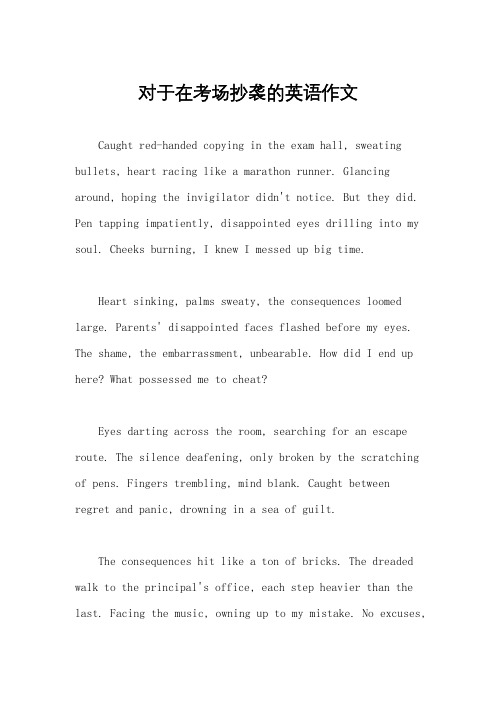
对于在考场抄袭的英语作文Caught red-handed copying in the exam hall, sweating bullets, heart racing like a marathon runner. Glancing around, hoping the invigilator didn't notice. But they did. Pen tapping impatiently, disappointed eyes drilling into my soul. Cheeks burning, I knew I messed up big time.Heart sinking, palms sweaty, the consequences loomed large. Parents' disappointed faces flashed before my eyes. The shame, the embarrassment, unbearable. How did I end up here? What possessed me to cheat?Eyes darting across the room, searching for an escape route. The silence deafening, only broken by the scratching of pens. Fingers trembling, mind blank. Caught betweenregret and panic, drowning in a sea of guilt.The consequences hit like a ton of bricks. The dreaded walk to the principal's office, each step heavier than the last. Facing the music, owning up to my mistake. No excuses,no escape. Just me and my poor choices.Sweaty palms, shaky voice, stomach churning. Admitting my wrongdoing, facing the consequences. The disappointment in their eyes, like a knife to the heart. Promising to do better, to make amends. But the damage already done, trust shattered like glass.Walking out of the office, head hung low. The weight of my actions crushing me. Regret gnawing at my conscience, a bitter taste in my mouth. Learning the hard way, the consequences of cheating. A mistake I'll never make again.。
英语作文 抄袭作业
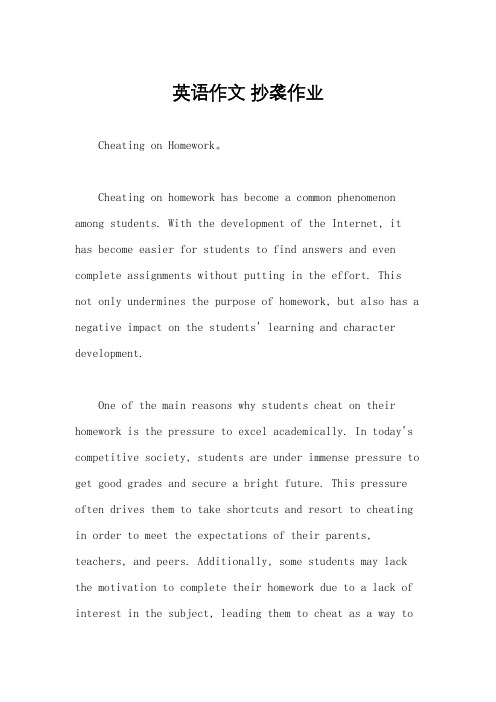
英语作文抄袭作业Cheating on Homework。
Cheating on homework has become a common phenomenon among students. With the development of the Internet, it has become easier for students to find answers and even complete assignments without putting in the effort. This not only undermines the purpose of homework, but also has a negative impact on the students' learning and character development.One of the main reasons why students cheat on their homework is the pressure to excel academically. In today's competitive society, students are under immense pressure to get good grades and secure a bright future. This pressure often drives them to take shortcuts and resort to cheating in order to meet the expectations of their parents, teachers, and peers. Additionally, some students may lack the motivation to complete their homework due to a lack of interest in the subject, leading them to cheat as a way toavoid the work altogether.The prevalence of technology has also made it easierfor students to cheat on their homework. With the vast amount of information available on the Internet, students can easily find answers to their homework assignments with just a few clicks. This easy access to information has made it tempting for students to cheat, as they can simply copy and paste answers without fully understanding the material. Furthermore, the use of technology has also given rise to new forms of cheating, such as using online homework help services or sharing answers with classmates through messaging apps.Cheating on homework not only hinders the students' academic development, but also has a detrimental impact on their character. When students cheat, they are depriving themselves of the opportunity to learn and developimportant skills such as critical thinking, problem-solving, and time management. Additionally, cheating undermines the value of hard work and honesty, which are essentialqualities for success in both academic and professionalsettings. By resorting to cheating, students are not only harming themselves, but also setting a negative example for their peers and future generations.In order to address the issue of cheating on homework, it is important for educators and parents to take proactive measures. Teachers can design homework assignments that require critical thinking and analysis, making it more difficult for students to cheat. Additionally, they can use plagiarism detection tools to identify instances of cheating and take appropriate disciplinary actions. Parents can also play a role in preventing cheating by instilling values of honesty and integrity in their children, and providing them with the support and encouragement they need to succeed academically.In conclusion, cheating on homework is a widespread problem that has serious implications for students' academic and personal development. It is important for educators, parents, and students themselves to work together to address this issue and promote a culture of academic integrity. By doing so, we can ensure thatstudents are able to develop the skills and qualities they need to succeed in both their academic and professional lives.。
抄袭英文英语作文
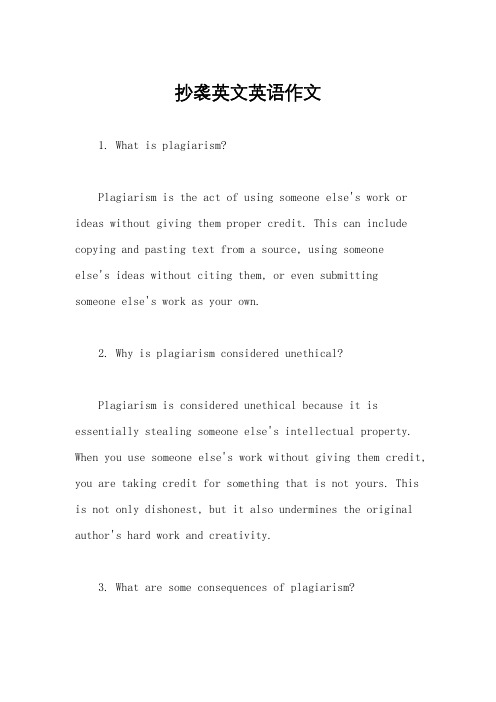
抄袭英文英语作文1. What is plagiarism?Plagiarism is the act of using someone else's work or ideas without giving them proper credit. This can include copying and pasting text from a source, using someoneelse's ideas without citing them, or even submitting someone else's work as your own.2. Why is plagiarism considered unethical?Plagiarism is considered unethical because it is essentially stealing someone else's intellectual property. When you use someone else's work without giving them credit, you are taking credit for something that is not yours. This is not only dishonest, but it also undermines the original author's hard work and creativity.3. What are some consequences of plagiarism?The consequences of plagiarism can be severe. In academic settings, plagiarism can result in failing grades, suspension, or even expulsion from school. In professional settings, plagiarism can damage your reputation and even lead to legal action. Additionally, plagiarizing can lead to a lack of personal growth and development, as you are not taking the time to learn and develop your own ideas.4. How can you avoid plagiarism?The best way to avoid plagiarism is to always give credit where credit is due. This means properly citing your sources and using quotation marks when necessary. Additionally, you can avoid unintentional plagiarism by taking careful notes and keeping track of where your ideas are coming from. Finally, it is important to always be honest and transparent about your sources and ideas.5. Why is it important to develop your own ideas?Developing your own ideas is important because it allows you to grow and learn as an individual. When yourely solely on the ideas of others, you are not challenging yourself to think critically or creatively. Additionally, developing your own ideas can lead to greater personal satisfaction and a sense of accomplishment. Finally, by developing your own ideas, you are contributing to the larger body of knowledge and creativity in the world.。
- 1、下载文档前请自行甄别文档内容的完整性,平台不提供额外的编辑、内容补充、找答案等附加服务。
- 2、"仅部分预览"的文档,不可在线预览部分如存在完整性等问题,可反馈申请退款(可完整预览的文档不适用该条件!)。
- 3、如文档侵犯您的权益,请联系客服反馈,我们会尽快为您处理(人工客服工作时间:9:00-18:30)。
关于抄袭的英语作文3篇
各位读友大家好!你有你的木棉,我有我的文章,为了你的木棉,应读我的文章!若为比翼双飞鸟,定是人间有情人!若读此篇优秀文,必成天上比翼鸟!
关于抄袭的英语作文一:抄袭(1713字)in the picture we can see that a man is fishing attentively by the lake.behind him there is a scholar who is stealing the fish in the man’s bucket.it is obvious that the drawer of the picture tries to reveal a serious problemin the academic circle of our country — plagiarism. in recent years academiccheats have become rampant. quite a lot of graduate students and scholars“use” others’ideas, articles and papers without acknowledging the sourceof information. they copy them without the fear that they might be caught.for a long time we paid less attention to the problem of plagiarism,
butnow we are increasingly aware of its negative effects. plagiarists’misconduct simply mean “stealing” others’intellectual and academicaccomplishments, which not only depreciates their own humanity but contaminatesthe climate of the academic circle. academic falsification is like an epidemicdisease that spreads fast and will destroy the healthy development of academicstudies. what’s worse, these plagiarists have set a very disreputable exampleto the younger generation.so what attitude should we hold towards it? from my point of view, weshould resolutely battle against this ill phenomenon. education of moralityshould be strengthened among the scholars and students. those who steal others’academic achievements should be given severe punishment whenever they arespotted. if necessary, we can resort to the law to protect the interest of theoriginal writer
and inventor. we must recognize that fighting againstplagiarism requires our persistent efforts.翻译在画中我们可以看到一位男子正在专心地在湖边钓鱼,在他身后有一位学者模样的人正从钓鱼人的鱼桶中偷鱼。
显然,作这幅画的人是想揭示我国学术界的一个严重的问题——剽窃。
近年来学术欺诈盛行,有不少研究生、学者“利用”别人的想法、文章和论文而不注明信息来源。
他们抄袭他人作品,不怕被抓。
对剽窃问题很长时间以来我们关注甚少,现在我们越来越多地意识到它的负面影响。
剽窃行为其实就是“偷”他人的知识和学术成就。
剽窃不仅贬低人格,而且污染学术风气,它会像传染病那样迅速蔓延,破坏学术研究的健康发展。
更糟的是,这些剽窃者给年轻的一代树立了坏榜样。
对剽窃我们应该持什么态度呢?我的观点是,我们应该与剽窃现象作坚决的斗争,对学者和学生加强道德教育。
对那些对剽他人学术成果的人,一经发现严厉惩罚严
惩不贷。
如有必要,我们应该采用法律手段,保护作者和发明人的利益。
我们必须认识到与剽窃斗争需要作出抗不懈努力。
关于抄袭的英语作文二:抄袭(463字)my opinion on copying oth ers’ homeworkit is konwn to us all that some students copy others’ homework,their reasons are as below:first of all,the homework is too much and always difficult;the second,they are not intrested in the lessons;and the third,the aim of finishing their homework is to please the teacher.
各位读友大家好!你有你的木棉,我有我的文章,为了你的木棉,应读我的文章!若为比翼双飞鸟,定是人间有情人!若读此篇优秀文,必成天上比翼鸟!。
